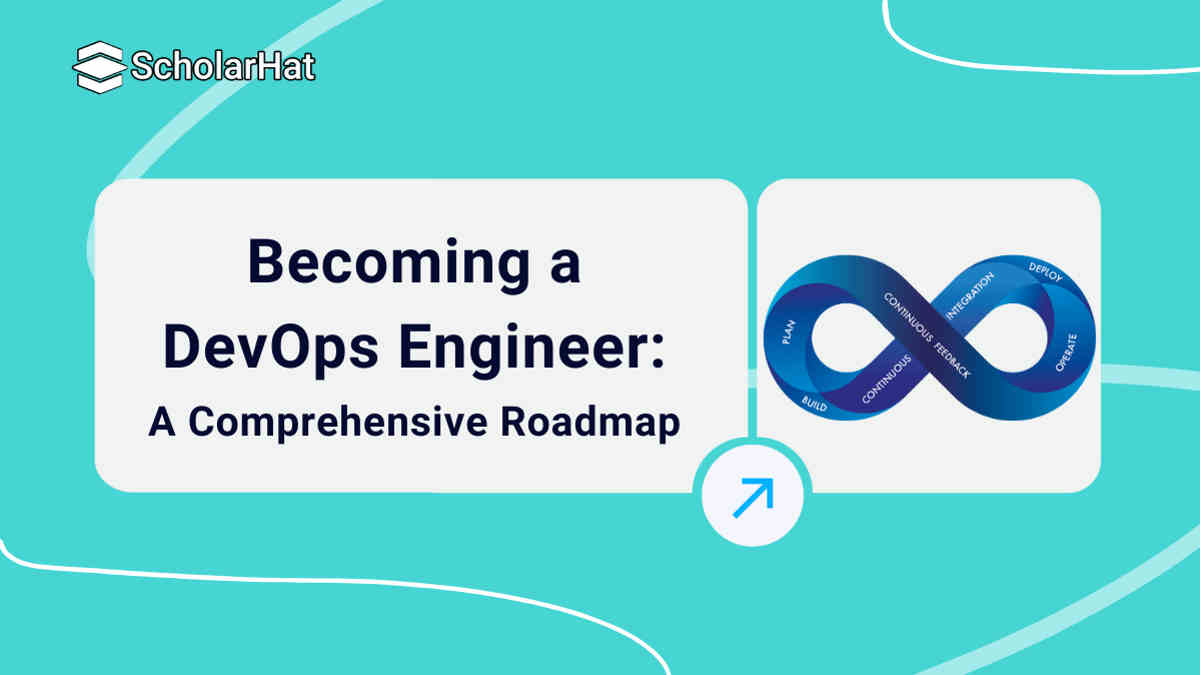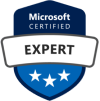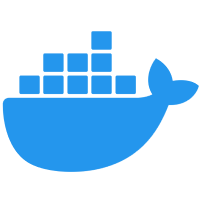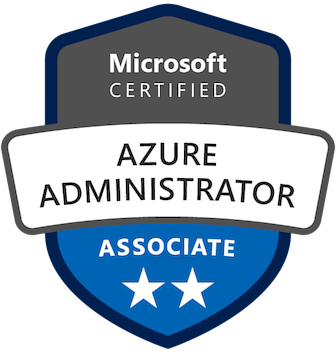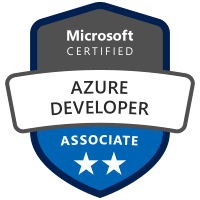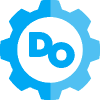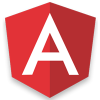28
DecDevOps Roadmap: Your Complete Guide to Master DevOps in 2025
Are you looking to start your DevOps journey in 2025 but unsure where to begin? With the rapid evolution of cloud technologies, automation, and CI/CD pipelines, having a clear DevOps roadmap for beginners is essential to stay ahead. Whether you're an aspiring DevOps engineer, a developer, or an IT professional, this guide will walk you through the best DevOps learning path for 2025, covering key tools, skills, and certifications.
In this blog, we’ll break down the DevOps roadmap 2025 into manageable steps—from learning Linux and scripting to mastering Docker, Kubernetes, and cloud platforms like AWS or Azure. By following this structured approach, you’ll gain hands-on experience and industry-relevant expertise to thrive in a DevOps career. Let’s dive in!
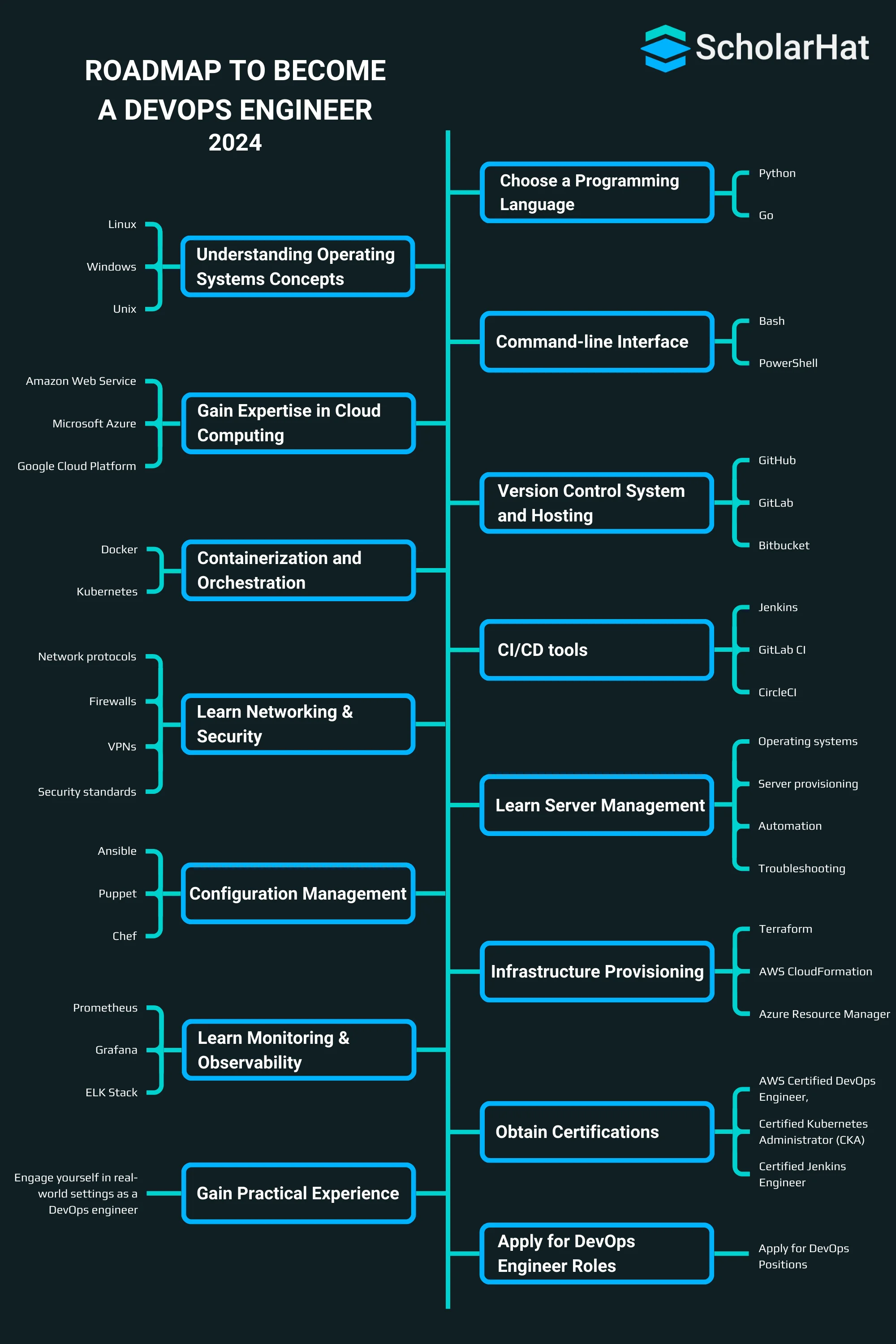
| Read More: Top 50 DevOps Interview Questions and Answers |
What is DevOps?
- DevOps is a set of methods that combine software development (Dev) with IT operations (Ops) to reduce development time and continuously provide high-quality software.
- It focuses on teamwork, automation, and integration between development and operations teams to increase deployment speed and reliability. DevOps attempts to improve system maintenance and scalability by implementing a more efficient and unified workflow process.
| Read More: What is DevOps? |
Who is a DevOps Engineer?
Now that you understand DevOps, the question arises: Is there a specific designation for this type of work?
Yes, there is a job designation called DevOps Engineer. A DevOps Engineer is responsible for managing DevOps techniques and ensuring that the deployment process runs well. The essential tasks of a DevOps Engineer may differ from one firm to the next. However, these are some of the most important ones:
- Integrating CI/CD operations.
- The automation of the infrastructure.
- Collaborating with several teams, particularly SDE and IT operations teams.
- Managing the availability and performance of software programs.
- Troubleshooting and addressing organizational challenges.
DevOps Engineer Roles and Responsibilities
A DevOps Engineer is responsible for linking the gap between development and operations teams, automating and optimizing processes to accelerate product delivery, improve accuracy, and assure scalability in modern IT settings. The key roles include:
- Continuous Integration/Continuous Deployment (CI/CD): Create and manage pipelines to automate software delivery procedures.
- Infrastructure as Code: Use Terraform or CloudFormation to automate infrastructure provisioning and administration.
- Monitoring and logging: Configure monitoring tools (such as Prometheus and the ELK stack) to guarantee system stability and performance.
- Configuration Management: Use tools like Ansible, Chef, or Puppet to prevent configuration drift and assure consistency across environments.
- Collaboration between Development and Operations: Close the gap between the development and operations teams to streamline workflows and increase deployment efficiency.
- Implement security: Implement security best practices and ensure industry compliance (e.g., GDPR, HIPAA).
- Cloud Platform Expertise: Optimize infrastructure and services using cloud platforms such as AWS, Azure, or Google Cloud.
| Read More: Roles and Responsibilities of a DevOps Engineer |
DevOps Learning Path - How to Become a DevOps Engineer
1. Choose a Programming Language
Choosing a language can be challenging for a developer. Still, for those starting in the IT sector, it is suggested that you use any programming language as your primary language so that you can advance your career in the software industry.
In this DevOps learning challenge, we will continue by selecting one of the two programming languages:
- Python
- Go
Both of these are easy-to-learn languages with simple syntax and broad future scope.
Let's take a look at the most crucial topics to consider if you want to have a strong understanding of a programming language.
| Explore this - 1. Most In-Demand Programming Languages Right Now 2. 10 Reasons Python is a Great First Language to Learn |
2. Understanding Operating Systems Concepts
- A DevOps Engineer is expected to have a deep understanding of operating systems so that they can easily manage infrastructure, troubleshoot issues and errors, and optimize performance.
- OS fundamentals like handling processes, memory management, file systems, and networking are essential for automating and improving software deployment and infrastructure management.
- Knowledge of several operating systems, such as Linux, Windows, and UNIX, is critical for efficient DevOps methods because it enables smooth integration and operation across multiple systems and platforms.
Now, let's get into the intricacies of Linux, Windows, and UNIX.
1. Linux
Linux plays an important role in the DevOps roadmap since it is widely used in servers and cloud environments. Understanding Linux requires knowledge of the file system, command-line interface, shell scripting, package management, and system services. Linux proficiency enables DevOps workflows to be automated, configured, and troubleshooted more effectively.
2. Windows
Windows OS is significant in the DevOps roadmap for job management and automation in environments with a lot of Windows servers and apps. Mastering PowerShell for scripting and automation, understanding Windows Server management, and integrating with tools such as Jenkins and Azure DevOps for continuous integration and deployment (CI/CD) are all critical.
Proficiency in the Windows operating system ensures that hybrid or Windows-centric infrastructures run smoothly and efficiently.
3. Unix
UNIX is essential on the DevOps roadmap because of its stability and popularity in enterprise environments. Understanding essential utilities and commands, controlling services and processes, and learning shell scripting for automation are all essential parts.
It is critical to comprehend UNIX variations like AIX and Solaris, as well as their package management and security standards. UNIX proficiency guarantees that system operations and automation run smoothly and reliably in complicated, large-scale contexts.
3. Command-line Interface
- DevOps heavily relies on the command-line interface (CLI) for script execution, task automation, and efficient system configuration management.
- Proficiency in CLI tools like Bash, PowerShell, and different shell environments allows for quick and precise control of systems and applications.
- Mastering CLI commands and scripting is essential for speeding workflows, diagnosing difficulties, and integrating multiple DevOps tools and procedures.
4. Gain Expertise in Cloud Computing
Mastering cloud technology with AWS, Azure, and GCP is critical for effective infrastructure management, scalable deployments, and sophisticated cloud services use.
1. AWS (Amazon Web Service)
AWS is a complete cloud platform that provides a wide range of services, including processing power, storage, and networking. It is known for its scalability, dependability, and extensive worldwide infrastructure, making it a popular choice for companies of all sizes.
2. Azure (Microsoft Azure)
Microsoft Azure is a cloud computing service that offers several solutions, including virtual machines, databases, and AI technologies. It is highly linked to Microsoft products and services, making it a good choice for enterprises that currently use Microsoft technology.
3. Google Cloud Platform (GCP)
Google Cloud Platform (GCP) is a package of cloud services noted for its strengths in data analytics, machine learning, and containerization. It offers extensive tools for developing, deploying, and scaling applications on Google's infrastructure, with an emphasis on innovation and performance.
5. Version Control System and Hosting
A version control system (VCS) is required in DevOps to track code changes, manage collaboration, and keep a history of alterations.
Hosting providers such as GitHub, GitLab, and Bitbucket offer cloud-based repository hosting systems. These systems allow teams to exchange code, handle pull requests, and link with CI/CD pipelines, hence improving collaboration and automation during the development process.
6. Containerization and Orchestration
Containerization organizes an application and its associated components into a single unit known as a container, ensuring that it functions consistently across all environments.
These containers are managed by orchestration technologies such as Kubernetes and Docker Swarm, which automate deployment, scaling, and networking, making applications more reliable and efficient.
1. Docker
In DevOps, Docker containers protect software and its dependencies, maintaining consistency across several environments. They make application deployment, scaling, and management more efficient while also encouraging agility and communication between development and operations teams.
2. Kubernetes
Understanding Kubernetes in DevOps includes using a management platform to simplify the deployment, scaling, and administration of application containers. Kubernetes allows practical resource usage, robustness, and scalability across clusters, hence facilitating continuous integration and delivery (CI/CD) pipelines in DevOps processes.
| Read More: Kubernetes vs Docker: Analyzing The Differences |
7. CI/CD tools
CI/CD technologies automate both the integration of code changes and the release or deployment of applications. Jenkins, GitLab CI, and CircleCI enable the automation of the process by running tests, creating code, and deploying it to production, resulting in more rapid and secure software releases.
| Read More: Building CI/CD Pipeline with the Azure DevOps |
8. Learn Networking & Security
Understanding networking and security is critical in DevOps to guarantee infrastructure reliability and security. This includes an understanding of network protocols, firewalls, VPNs, and security standards for protecting applications and data. Proficiency in these areas contributes to the development, management, and security of dependable and efficient systems.
9. Learn Server Management
Learning server management involves knowing how to set up, maintain, and manage servers so that they work efficiently and reliably. This covers experience with operating systems, server provisioning, automation, and troubleshooting. Server management expertise aids in maintaining peak performance, decreasing downtime, and providing a stable environment for applications.
10. Configuration Management
Configuration management is the process of automating server and software setup and maintenance utilizing tools. Ansible, Puppet, and Chef assist in managing configurations consistently across several environments, guaranteeing that systems are dependable, scalable, and simple to manage. This avoids manual errors and increases deployment efficiency.
11. Infrastructure Provisioning
Infrastructure provisioning simplifies the configuration of computer hardware, including servers, storage, and networking. Terraform, AWS CloudFormation, and Azure Resource Manager are all tools that enable you to construct and manage infrastructure consistently and effectively. This ensures that environments are scalable, repeatable, and easily deployed or adjusted to match the requirements of applications.
12. Learn Monitoring & Observability
Learning monitoring and observability entails understanding how to track the performance and health of software and infrastructure. Prometheus, Grafana, and ELK Stack are tools for collecting, analyzing, and visualizing metrics and logs. This guarantees that problems are identified early, performance is optimized, and systems are dependable and resilient.
13. Obtain Certifications
Certifications in DevOps confirm your skill and knowledge of numerous technologies and methods. Certifications such as AWS Certified DevOps Engineer, Certified Kubernetes Administrator (CKA), and Certified Jenkins Engineer demonstrate expertise in cloud platforms, container orchestration, and CI/CD tools, respectively. These certificates boost credibility, create new employment options, and demonstrate a dedication to ongoing learning and professional development in DevOps.
| Read More: Azure DevOps Certification Path [AZ-400] |
| ScholarHat provides the following certifications related to DevOps: |
14. Gain Practical Experience
Engage yourself in real-world settings as a DevOps engineer by working on teams of professionals, deploying infrastructure as code, and learning configuration management technologies like Ansible or Chef. Hands-on expertise with cloud systems like AWS or Azure will be highly beneficial.
15. Apply for DevOps Engineer Roles
To apply for DevOps engineer positions, you must have experience with automation, CI/CD pipelines, cloud platforms (AWS, Azure, GCP), and tools such as Docker and Kubernetes. You must also present expertise in configuration management (Ansible, Puppet), monitoring, and troubleshooting distributed systems. You must showcase teamwork, problem-solving, and proactive deployment process improvement to ensure optimal infrastructure reliability.
Tools and Technologies Every DevOps Engineer Should Be Aware of
DevOps engineers should be knowledgeable about the DevOps tools and technology required for modern software delivery and infrastructure management. This includes:
- CI/CD Tools: Jenkins, GitLab CI, CircleCI
- Containerization: Docker
- Orchestration: Kubernetes, Docker Swarm
- Infrastructure as Code: Terraform, AWS CloudFormation, Azure Resource Manager
- Configuration Management: Ansible, Puppet, Chef
- Monitoring and Observability: Prometheus, Grafana, ELK Stack
- Version Control Systems: Git, GitHub, GitLab
- Cloud Platforms: AWS, Azure, Google Cloud Platform (GCP)
- Networking: TCP/IP, DNS, Firewalls, VPNs
- Security Best Practices: Encryption, Identity and Access Management (IAM), Security Audits
These tools and technologies enable effective collaboration, automation, scalability, and dependability in software development and infrastructure management operations.
| Read More: Top 17 DevOps Tools You Must Know |
DevOps Career Path
There has been a significant growth in organizations opting for DevOps practices. A career in DevOps can be rewarding, acknowledging the increase in demand for DevOps professionals. The DevOps career path grows from entry-level roles to more advanced and specialized positions. Let us guide you on the various job positions in the path of DevOps as a career with their basic responsibilities:
1. Entry-Level Positions
DevOps Intern/Junior DevOps Engineer
- Assistance in infrastructure provisioning and management.
- Contribution to CI/CD pipeline setup maintenance.
- To experience working with tools like Docker, Jenkins, and Terraform.
2. Mid-Level Positions
DevOps Engineer
- Management of cloud infrastructure.
- Developing and maintenance of CI/CD pipelines.
- Containerization and orchestration with tools like Docker and Kubernetes.
- Monitoring and troubleshooting infrastructure.
3. Senior-Level Positions
Senior DevOps Engineer/DevOps Architect
- Designing efficient infrastructure solutions.
- Leading and mentoring junior DevOps Engineers.
- Collaborating with cross-functional teams.
- Implementation of advanced CI/CD strategies and automation frameworks.
- Enhancing security and compliance.
4. Specialized Roles
DevOps Security Engineer
- Implementation of security best practices.
- Vulnerability assessments and penetration testing.
- Adhering to compliance with industry regulations.
- Collaboration with DevOps and security teams.
DevOps Data Engineer
- Data management, analytics, and visualization.
- Implementation of data pipelines and ETL processes.
- Collaboration with data scientists and analysts to get data insights.
DevOps Engineer Salary
The demand for DevOps Engineers is currently super high. You might wonder how much a DevOps Engineer can earn from this work. Let me tell you the statistics.
According to PayScale, the average salary of a DevOps Engineer in India is INR 763,544 per annum. Based on experience, the salary for an entry-level DevOps Engineer role in India is INR 3 66,337 per year, INR 11 42,206 per year for mid-level. For experienced DevOps engineers, it goes up to 16, 32, and 155 per year. Based on skills possessing Python programming skills can get you INR 7,23,000 per year.
| Read More: DevOps Engineer Salary in India |
| Read More DevOps articles: |
Summary
To summarize, learning the DevOps roadmap for beginners to advanced entails learning programming languages, understanding operating system and networking concepts, becoming skilled in Linux, mastering source code management, leveraging cloud computing platforms, implementing Docker and Kubernetes for containers, gaining practical experience, and applying for DevOps engineer positions.
Success in this dynamic sector requires continuous learning, hands-on experience, and a proactive attitude to technological trends.
FAQs
Take our Devops skill challenge to evaluate yourself!

In less than 5 minutes, with our skill challenge, you can identify your knowledge gaps and strengths in a given skill.

